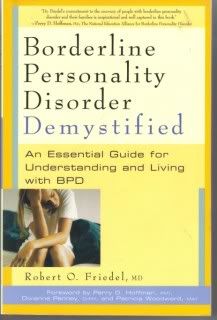A Community Health Minute
Borderline Personality Disorder Definition
By Mayo Clinic staff
Borderline personality disorder can be a distressing medical condition, both for the people who have it and for those around them. When you have borderline personality disorder (BPD), you have difficulty controlling your emotions and are often in a state of upheaval — perhaps as a result of harmful childhood experiences or brain dysfunction.
With borderline personality disorder your image of yourself is distorted, making you feel worthless and fundamentally flawed. Your anger, impulsivity and frequent mood swings may push others away, even though you yearn for loving relationships.
Increasing awareness and research are helping improve the treatment and understanding of borderline personality disorder. Emerging evidence indicates that people with borderline personality disorder often get better over time and that they can live happy, peaceful lives.
Symptoms By Mayo Clinic staff
Borderline personality disorder affects how you feel about yourself, how you relate to others and how you behave.
When you have BPD, you often have an insecure sense of who you are. That is, your self-image or sense of self often rapidly changes. You may view yourself as evil or bad, and sometimes may feel as if you don't exist at all. An unstable self-image often leads to frequent changes in jobs, friendships, goals, values and gender identity.
Your relationships are usually in turmoil. You often experience a love-hate relationship with others. You may idealize someone one moment and then abruptly and dramatically shift to fury and hate over perceived slights or even minor misunderstandings. This is because people with the disorder have difficulty accepting gray areas — things are either black or white. For instance, in the eyes of a person with BPD, someone is either good or evil. And that same person may seem good one day and evil the next.
Other signs and symptoms of borderline personality disorder may include:
* Impulsive and risky behavior, such as risky driving, unsafe sex, gambling
sprees or taking illicit drugs
* Strong emotions that wax and wane frequently
* Intense but short episodes of anxiety or depression
* Inappropriate anger, sometimes escalating into physical confrontations
* Difficulty controlling emotions or impulses
* Suicidal behavior
* Fear of being alone
Is someone you care about causing you a great deal of pain?
Do you find yourself concealing what you think or feel because you're afraid of the other person's reaction or because it just doesn't seem worth the horrible fight or hurt feelings that will follow?
Do you feel that anything you say or do will be twisted and used against you? Are you blamed and criticized for everything wrong in the relationship-even when it makes no logical sense?
Are you the focus of intense, violent, and irrational rages, alternating with periods when the other person acts perfectly normal and loving? Does no one believe you when you explain that this is going on?
Do you feel manipulated, controlled, or even lied to sometimes? Do you feel like you're the victim of emotional blackmail?
Do you feel like the person you care about sees you as either all good or all bad, with nothing in between? Is there sometimes no rational reason for the switch?
Are you afraid to ask for things in the relationship because you will be told that you're too demanding or that there is something wrong with you? Are you told that your needs are not important?
Is the person always denigrating or denying your point of view? Do you feel that their expectations of you are constantly changing, so you can never do anything right?
Are you accused of doing things you never did and saying things you never said? Do you feel misunderstood a great deal of the time, and when you try to explain do you find that the other person doesn't believe you?
Are you constantly being put down? When you try to leave the relationship does the other person try to prevent you from leaving in a variety of ways (anything from declarations of love and promises to change to implicit or explicit threats)?
Do you have a hard time planning anything (social engagements, etc.) because of the other person's moodiness, impulsiveness, or unpredictability? Do you make excuses for their behavior or try to convince yourself that everything is okay?
Right now, are you thinking, "I had no idea that anyone else was going through this?"
Thoughts that may indicate BPD
Does this person:
- Alternate between seeing people as either flawless or evil? Have difficulty remembering the good things about a person they're casting in the role of villain?
- Find it impossible to recall anything negative about this person when they become the hero?
- Alternate between seeing others as completely for them or against them?
- Alternate between seeing situations as either disastrous or ideal?
- Alternate between seeing themselves as either worthless or flawless?
- Have a hard time recalling someone's love for them when they're not around?
- Believe that others are either completely right or totally wrong?
- Change their opinions depending upon who they're with?
- Alternate between idealizing people and devaluing them?
- Remember situations very differently than other people, or find themselves unable to recall them at all?
- Believe that others are responsible for their actions-or take too much responsibility for the actions of others?
- Seem unwilling to admit to a mistake-or feel that everything that they do is a mistake?
- Base their beliefs on feelings rather than facts?
- Not realize the effects of their behavior on others?
Feelings that may indicate BPD
Does this person:- Feel abandoned at the slightest provocation?
- Have extreme moodiness that cycles very quickly (in minutes or hours)?
- Have difficulty managing their emotions?
- Feel emotions so intensely that it's difficult to put others' needs-even those of their own children-ahead of their own?
- Feel distrustful and suspicious a great deal of the time?
- Feel anxious or irritable a great deal of the time?
- Feel empty or like they have no self a great deal of the time?
- Feel ignored when they are not the focus of attention?
- Express anger inappropriately or have difficulty expressing anger at all?
- Feel that they never can get enough love, affection, or attention?
- Frequently feel spacey, unreal, or out of it?
Behaviors that may indicate BPD
Does this person:
- Have trouble observing others' personal limits?
- Have trouble defining their own personal limits?
- Act impulsively in ways that are potentially self-damaging, such as spending too much, engaging in dangerous sex, fighting, gambling, abusing drugs or alcohol, reckless driving, shoplifting, or disordered eating?
- Mutilate themselves-for example, purposely cutting or burning their skin?
- Threaten to kill themselves-or make actual suicide attempts?
- Rush into relationships based on idealized fantasies of what they would like the other person or the relationship to be?
- Change their expectations in such a way that the other person feels they can never do anything right?
- Have frightening, unpredictable rages that make no logical sense-or have trouble expressing anger at all?
- Physically abuse others, such as slapping, kicking, and scratching them?
- Needlessly create crises or live a chaotic lifestyle?
- Act inconsistently or unpredictably?
- Alternately want to be close to others, then distance themselves?
(Examples include picking fights when things are going well or alternately ending relationships and then trying to get back together.)
- Cut people out of their life over issues that seem trivial or overblown?
- Act competent and controlled in some situations but extremely out of control in others?
- Verbally abuse others, criticizing and blaming them to the point where it feels brutal?
- Act verbally abusive toward people they know very well, while putting on a charming front for others? Can they switch from one mode to the other in seconds?
- Act in what seems like extreme or controlling ways to get their own needs met?
- Do or say something inappropriate to focus the attention on them when they feel ignored?
- Accuse others of doing things they did not do, having feelings they do not feel, or believing things they do not believe?
Now just take one minute to read this...
2 Timothy 3
1But mark this: There will be terrible times in the last days. 2People will be lovers of themselves, lovers of money, boastful, proud, abusive, disobedient to their parents, ungrateful, unholy, 3without love, unforgiving, slanderous, without self-control, brutal, not lovers of the good, 4treacherous, rash, conceited, lovers of pleasure rather than lovers of God— 5having a form of godliness but denying its power. Have nothing to do with them. 6They are the kind who worm their way into homes and gain control over weak-willed women, who are loaded down with sins and are swayed by all kinds of evil desires, 7always learning but never able to acknowledge the truth. 8Just as Jannes and Jambres opposed Moses, so also these men oppose the truth—men of depraved minds, who, as far as the faith is concerned, are rejected. 9But they will not get very far because, as in the case of those men, their folly will be clear to everyone.
10You, however, know all about my teaching, my way of life, my purpose, faith, patience, love, endurance, 11persecutions, sufferings—what kinds of things happened to me in Antioch, Iconium and Lystra, the persecutions I endured. Yet the Lord rescued me from all of them. 12In fact, everyone who wants to live a godly life in Christ Jesus will be persecuted, 13while evil men and impostors will go from bad to worse, deceiving and being deceived. 14But as for you, continue in what you have learned and have become convinced of, because you know those from whom you learned it, 15and how from infancy you have known the holy Scriptures, which are able to make you wise for salvation through faith in Christ Jesus. 16All Scripture is God-breathed and is useful for teaching, rebuking, correcting and training in righteousness, 17so that the man of God may be thoroughly equipped for every good work.



Hmmm....
ReplyDeleteSadly, people with this disorder do NOT even see they are the one with the issue. They will automatically see it as the other person.
Thank God we aren't called to rehabilitate them. It would be like banging your head against the wall!
Personality disorder is a type of psychological disorder. There are many negative effects of personality disorder. It affects badly to a person's life, family and social life. People with personality disorder have conflicts with many other people. There are many types of personality disorders like Paranoid personality disorder, Schizoid personality disorder, Dissocial personality disorder etc. People with this disorder have negative attitude, instability in relationships, loves breaking rules and regulations, mistrust for others etc. For more details refer personality disorders
ReplyDelete